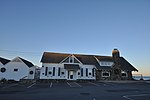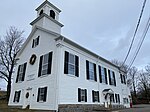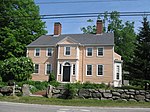Jenness State Beach
1980 establishments in New HampshireBeaches of New HampshireParks in Rockingham County, New HampshireProtected areas established in 1980Rye, New Hampshire ... and 1 more
State parks of New Hampshire

Jenness State Beach is a small state park located on the Atlantic Ocean in the town of Rye, New Hampshire. The park offers swimming at a sandy beach with a bathhouse and picnicking. The parking lot can accommodate 67 cars.
Excerpt from the Wikipedia article Jenness State Beach (License: CC BY-SA 3.0, Authors, Images).Jenness State Beach
Perkins Road,
Geographical coordinates (GPS) Address Website External links Nearby Places Show on map
Geographical coordinates (GPS)
| Latitude | Longitude |
|---|---|
| N 42.9856 ° | E -70.7619 ° |
Address
Jenness State Beach
Perkins Road
03870
New Hampshire, United States
Open on Google Maps










